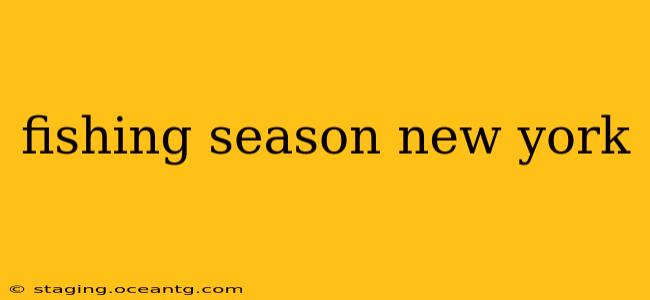New York State boasts a diverse range of fishing opportunities, from the pristine lakes of the Adirondacks to the roaring currents of the Niagara River. Understanding New York's fishing seasons is crucial for a successful and legal angling experience. This comprehensive guide will walk you through the key aspects of fishing seasons in the Empire State, covering various species and regions. We'll also answer some frequently asked questions to help you plan your next fishing adventure.
What are the general fishing seasons in New York?
New York's fishing seasons vary greatly depending on the species and location. There isn't one single "fishing season" for the entire state. Generally, the open seasons for many popular game fish like trout and bass stretch from spring through fall, with specific opening and closing dates differing by region and even specific bodies of water. Always consult the official New York State Department of Environmental Conservation (DEC) website for the most up-to-date and precise information. Ignoring these regulations can result in significant fines.
What are the different fishing licenses needed in New York?
New York requires fishing licenses for residents and non-residents alike. The DEC website offers detailed information on license types, costs, and purchasing methods. Licenses are categorized by residency status, age, and sometimes specific fishing privileges. Remember to obtain the appropriate license before you go fishing. Failure to do so carries substantial penalties.
What fish can I catch during the spring fishing season in New York?
Spring is a prime time for many species. You'll likely find good fishing for trout in many rivers and streams as they move upstream to spawn. Bass fishing also picks up as water temperatures rise. Panfish, such as bluegill and sunfish, are active in lakes and ponds. Specific opening dates vary by region and species, so checking the DEC's regulations is crucial.
What are the best times to fish for trout in New York?
Trout fishing often coincides with the spring and fall seasons, when water temperatures are cooler and trout are actively feeding. Early morning and evening are usually the most productive times to fish for trout, as they tend to be more active during these cooler periods of the day. Different species of trout have different preferences, so research your target species and location for optimal results.
Where can I find information on specific fishing regulations for a particular lake or river?
The New York State Department of Environmental Conservation (DEC) website is your go-to resource for detailed fishing regulations. Their website provides interactive maps, searchable databases, and comprehensive guides that allow you to look up regulations specific to individual lakes, rivers, and even sections of waterways. Using this tool ensures you're aware of all applicable rules and limits before you cast your line.
Are there any special regulations for fishing in certain areas of New York?
Yes, certain areas may have unique regulations due to conservation efforts or specific environmental considerations. For example, some waters might have catch-and-release regulations for certain species, size limits, or restrictions on the number of fish you can keep. Always consult the DEC website for the most current information on any special regulations in your chosen fishing spot. Ignoring these can lead to penalties.
What are some resources to help me plan my fishing trip in New York?
Besides the official DEC website, several other resources can help you plan your fishing trip. Local fishing guides, sporting goods stores, and online fishing forums often provide valuable information on local conditions, fishing techniques, and hot spots. Thorough research will maximize your chances of a successful and memorable fishing experience.
Disclaimer: This information is for general guidance only. Always consult the official New York State Department of Environmental Conservation (DEC) website for the most current and accurate fishing regulations before embarking on your fishing trip. Regulations can and do change, so staying informed is vital.
